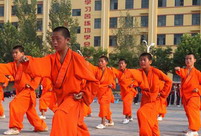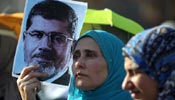 Chinese Air Force's combat group organizes actual-combat training
Chinese Air Force's combat group organizes actual-combat training Street fitness instructor
Street fitness instructor
 Couples from 56 ethnic groups create new Guinness record of proposal
Couples from 56 ethnic groups create new Guinness record of proposal
 Pakistan celebrates Independence Day
Pakistan celebrates Independence Day
 Collective wedding ceremony for 'Beijing drifters’ held in Happy Valley
Collective wedding ceremony for 'Beijing drifters’ held in Happy Valley
 An antique camera collector in Tianjin
An antique camera collector in Tianjin
 Protests held in Gaza, Jordan to support Egyptian people
Protests held in Gaza, Jordan to support Egyptian people
 China Beijing Int'l Gifts, Premium&Houseware Exhibition opens
China Beijing Int'l Gifts, Premium&Houseware Exhibition opens
 Joey Yung's new album cover released
Joey Yung's new album cover released
 |
| (Illustration: GT/Chen Xia) |
Related:
>> Reading to get new push in law
The 10th Shanghai Book Fair (SBF) kicked off on Wednesday and will run until next Tuesday. The annual cultural event provides not only spiritual food to people of all ages but a communication platform for publishers, writers, translators and their readers as well.
Given the declining fortunes of book publishers and book retailers, it's exciting to see the book fair under the media spotlight again.
Although cheaper books are easily found on the Internet, to many residents, it's a real pity that the city lacks good brick-and-mortar stores to browse the shelves and make unexpected discoveries.
The book fair provides space for hundreds of temporary "bookstores" at the Shanghai International Exhibition Center near Jing'an Temple. Visitors to the fair can find a huge range of books at discounted prices.
The theme of this year's fair is "love reading, love life." Indeed, reading should be a lifelong practice. But unfortunately, Chinese people read much less than people in other nations. According to a survey in 2012, Chinese citizens read an average of 4.39 books a year, compared to 16 books for European and American citizens. Israelis topped the list by reading 64 books a year on average.
The survey found that Chinese people listed "too busy to read," "no reading habit" and "more time for TV" as reasons why they don't read more often.
For many Chinese, books are read as a means to an end rather than read for the sake of reading. Self-help and career advice books are bestsellers every year in China, as readers hope to find a silver bullet to making their fortune or getting ahead.
Nobody will deny that reading helps a person and a country. A good environment should be created to encourage reading.
Street corner bookstores serve as landmarks in neighbors like Singapore and Hong Kong. When people recommend to friends where to go in a foreign city, it's not uncommon to see bookstores on the list. But Shanghai lacks such a venue.
It is becoming increasingly common to hear about bookstores closing down or moving from a downtown venue to a suburban location to make ends meet. Year by year, bookstores are disappearing. Only at the beginning of September and March are bookstores packed, when students and parents flock to purchase educational materials assigned by school teachers.
The Shanghai Book Fair has become a brand for the city's cultural image. Publishing houses hope that they will receive more orders from clients when they introduce new books at the events. Editors hope to gain more feedback from the market and, at the same time, learn from pioneering publishers and gain inspiration for future projects. Authors can communicate with both literary experts and ordinary readers to find out how their books are received.
To visitors and readers, the book fair is a haven. Tickets are just 10 yuan ($1.64) in the day and 5 yuan in the evening. With enough water and food, you can stay inside the exhibition center for the whole day. If you don't have enough money to buy all the books you want, just finish reading them there! If you are lucky, you can attend lectures organized by the various publishing houses. Meet admired authors face-to-face and if you like, ask them for an autograph. Almost all the books are sold at a discounted price, so it's a great place to pick up books that are worth collecting or sharing with your family members and friends.
I remember bringing my then 11-year-old daughter to the fair two years ago. It was an eye-opening experience for her; she was amazed to look out over a sea of books. And she bought many books at very reasonable prices. Last year, I just gave her some money and let her visit the fair herself. She even purchased a healthcare book for her grandmother. Her grandmother said that the book is very useful and she changed some of her habits after reading its advice.
This year, I suggested that she go on Tuesday, as the last day of the fair usually brings the biggest discounts, and at the same time, she can avoid the weekend peak.
As this is the 10th edition of the annual fair, the organizers have outdone previous years with opening hours extended to 9 pm and an unprecedented number of international authors attending. However, there is still room for improvement.
Most glaringly, English-language scheduling information is scarce. A number of internationally renowned figures have been invited to the Shanghai International Literary Week, which is part of the book fair. Ilya Kamingsky, Norman Lebrecht, Ian Buruma and Toby Lichtig are among the foreign faces in Shanghai this week, but if you can't read Chinese, good luck finding out when and where they will speak. With no English-language website or social media presence, SBF has neglected the city's 170,000-plus expatriate community, the largest one on the Chinese mainland.
Personally, I would like to say that it remains to be seen whether the book fair can live up to its slogan and create a more permanent "love reading" atmosphere in Shanghai. To be frank, a literary event that comes around only once a year is not sufficient for a major cosmopolitan city. We don't want Shanghai to be labeled a cultural desert.
 Helicopters, tanks seen during China-Russia joint drill
Helicopters, tanks seen during China-Russia joint drill Conjoined twins separated in groundbreaking surgery
Conjoined twins separated in groundbreaking surgery Summer photos of Zhang Xinyi, how graceful
Summer photos of Zhang Xinyi, how graceful  Pakistan celebrates Independence Day
Pakistan celebrates Independence Day Beijing Int'l Gifts, Premium & Houseware Exhibition opens
Beijing Int'l Gifts, Premium & Houseware Exhibition opens Kung Fu soccer team trains at Songshan Shaolin training base
Kung Fu soccer team trains at Songshan Shaolin training base  Air Force's combat group conducts flight training in joint drills
Air Force's combat group conducts flight training in joint drills Protests held in Gaza, Jordan to support Egyptian people
Protests held in Gaza, Jordan to support Egyptian people Various sun protective outfits
Various sun protective outfits Jaguar Land Rover to recall 11,852 cars
Jaguar Land Rover to recall 11,852 cars In sports arena, you are my greatest rival!
In sports arena, you are my greatest rival! Top 10 fatal vipers on earth
Top 10 fatal vipers on earth Day|Week|Month